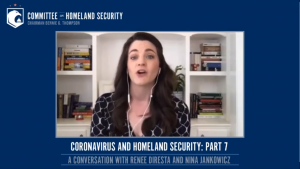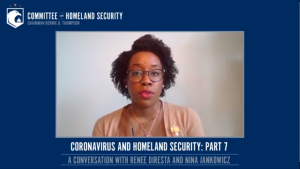Coronavirus misinformation puts country at risk, experts say
By Kevin Beese Staff Reporter — May 18, 2020
Nina Jankowicz, disinformation Fellow for the Science and Technology Innovation Program at the Wilson Center, a policy forum for tackling global issues, talks during the forum. Jankowicz said disinformation “affects our democratic process. It affects public safety and national security.” (Screenshot)
Better and more reliable information on the coronavirus is needed to fill the void that is allowing misinformation to thrive, according to experts.
“We need our government, we need Congress, we need civil society, we need doctors at this point out there communicating information to the public,” Renee DiResta, research manager at the Stanford University Internet Observatory, said during a May 11 virtual forum led by U.S. Rep. Lauren Underwood, D-14th.
“In the very near term, we need to be thinking about expertise and authoritative voices, that solid information is out there participating in the conversation and really doing the work of debunking and ensuring that good information is making it to the public,” DiResta said.
Underwood, vice chair of the U.S. House’s Homeland Security Committee, said the spread of coronavirus misinformation causes harm.
“Vaccine hesitancy and misinformation are already at dangerous levels in America. The dissemination of false narratives stokes baseless fears about vaccination and threatens the health of children, seniors, pregnant women, cancer patients and other vulnerable populations,” said Underwood, a former nurse. “Now, during a pandemic on a scale we have not seen in a century, these trends are more troubling than ever. The stakes are truly life and death.”
Underwood said she plans to introduce legislation requiring regulating standards for information posted on social media channels.
Nina Jankowicz, disinformation Fellow for the Science and Technology Innovation Program at the Wilson Center, a policy forum for tackling global issues, based in Washington D.C., said that disinformation is not a partisan issue.
“It really affects our democratic process. It affects public safety and national security,” Jankowicz said. “We need transparency and fact-based communication from our elected officials and our officials across government. We can’t hope to fight disinformation if we are engaging in those tactics ourselves. Until we realize that — we’re making so much progress on the civil society level, on the research level and some bureaus across government that are doing great work — I fear that it is all being undermined when we have this inconsistent messaging and disregard of the facts coming from certain parts of government.”

U.S. Rep. Lauren Underwood, D-14th, leads a May 11 virtual forum on coronavirus disinformation. She said the spread of misinformation about the coronavirus continues to cause harm. (Screenshot)
U.S. Rep. Elissa Slotkin, D-Mich., who sits on the Homeland Security Committee with Underwood, said that disinformation networks have been increasing their presence on social media platforms during the pandemic.
“They are trying to take advantage of the moment,” said Slotkin, who worked for the U.S Central Intelligence Agency and the Pentagon. “They have always been there. The stuff has gone on, but it is really taking an interesting turn as we don’t know everything about the virus.”
She said there are domestic and foreign spreaders of misinformation and social media platforms are not equal in the vigilance they show in shutting down untruths.
“We just need a little more rigor” in being critical of items on social media, Slotkin said.
“We need to educate ourselves and second-guess when we see something new and sort of strange and shocking,” Slotkin said. “We need to question it. I think that’s a healthy thing. We need digital literacy to go up.”
Underwood said coronavirus misinformation borrows from other disinformation tactics.
“The spread of false and potentially dangerous claims is clearly a threat to our national security,” Underwood said. “Misinformation about COVID-19 has proliferated rapidly since the virus emerged earlier this year.”
The congresswoman said misinformation campaigns from foreign countries prey on fears about the health and safety of loved ones. She noted that past misinformation campaigns have been linked to foreign adversaries such as Russia, China, and Iran.
“The federal government has to ensure that Americans are able to find and identify reliable information on how to keep their families safe during this crisis,” Underwood said.
She said people should turn to the U.S. Centers for Disease Control website, cdc.gov, for reliable information on the coronavirus.







